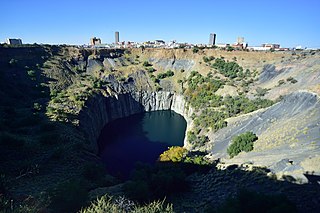
Kimberley is the capital and largest city of the Northern Cape province of South Africa. It is located approximately 110 km east of the confluence of the Vaal and Orange Rivers. The city has considerable historical significance due to its diamond mining past and the siege during the Second Anglo-Boer war. British businessmen Cecil Rhodes and Barney Barnato made their fortunes in Kimberley, and Rhodes established the De Beers diamond company in the early days of the mining town.
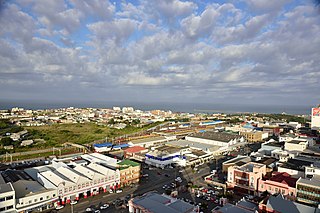
East London is a city on the southeastern coast of South Africa, in the Buffalo City Metropolitan Municipality, Eastern Cape Province. The city lies on the Indian Ocean coast, largely between the Buffalo River and the Nahoon River, and hosts the country's only river port. As of 2011, East London had a population of over 267,000 with over 755,000 in the surrounding metropolitan area.
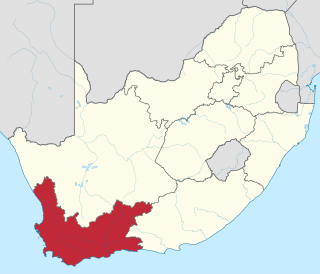
The Western Cape is a province of South Africa, situated on the south-western coast of the country. It is the fourth largest of the nine provinces with an area of 129,449 square kilometres (49,981 sq mi), and the third most populous, with an estimated 7 million inhabitants in 2020. About two-thirds of these inhabitants live in the metropolitan area of Cape Town, which is also the provincial capital. The Western Cape was created in 1994 from part of the former Cape Province. The two largest cities are Cape Town and George.

The Constitution of South Africa is the supreme law of the Republic of South Africa. It provides the legal foundation for the existence of the republic, it sets out the rights and duties of its citizens, and defines the structure of the Government. The current constitution, the country's fifth, was drawn up by the Parliament elected in 1994 in the South African general election, 1994. It was promulgated by President Nelson Mandela on 18 December 1996 and came into effect on 4 February 1997, replacing the Interim Constitution of 1993. The first constitution was enacted by the South Africa Act 1909, the longest-lasting to date. Since 1961, the constitutions have promulgated a republican form of government.
Elections in South Africa are held for the National Assembly, provincial legislatures and municipal councils. Elections follow a five-year cycle, with national and provincial elections held simultaneously and municipal elections held two years later. The electoral system is based on party-list proportional representation, which means that parties are represented in proportion to their electoral support. For municipal councils there is a mixed-member system in which wards elect individual councillors alongside those named from party lists.
Cape Peninsula University of Technology is a university in Cape Town, South Africa. It is the only university of technology in the Western Cape province, and is also the largest university in the province, with over 32,000 students. It was formed by merging the Cape Technikon and Peninsula Technikon as well as a few other independent colleges.

The South Africa Act 1909 was an Act of the Parliament of the United Kingdom that created the Union of South Africa out of the former Cape, Natal, Orange River, and Transvaal colonies. The Act also allowed for potential admission of Rhodesia into the Union, a proposal rejected by Rhodesian colonists in a 1922 referendum. The draft proposal was supported by the four colonial parliaments, but was opposed by Cape Colony premier W. P. Schreiner, who raised concerns that it would strip rights from non-white South Africans.
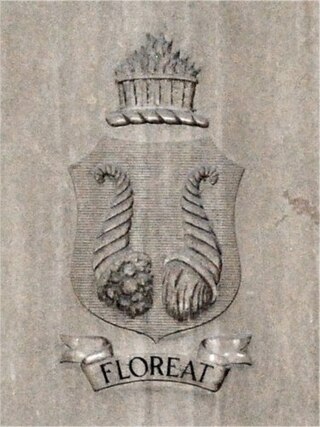
South African heraldry dates back to the 1650s, inheriting European heraldic traditions. Arms are borne by individuals, official bodies, local authorities, military units, and by a wide variety of organisations. South Africa has had its own heraldic authority since 1963, to provide armigers with legal protection, and to promote high standards of armorial practice.

The South African Heritage Resources Agency (SAHRA) is the national administrative body responsible for the protection of South Africa's cultural heritage. It was established through the National Heritage Resources Act, number 25 of 1999 and together with provincial heritage resources authorities is one of the bodies that replaced the National Monuments Council.
In South Africa, private and public health systems exist in parallel. The public system serves the vast majority of the population. Authority and service delivery are divided between the national Department of Health, provincial health departments, and municipal health departments.

Elizabeth Dipuo Peters is a South African politician who is the Deputy Minister of Small Business Development of the Republic of South Africa from 7 March 2023. She was previously the Minister of Transport from 10 July 2013 until 30 March 2017, in the Zuma administration, and former Minister of Energy from 2009 to 2013 having served as successor to Manne Dipico as the second Premier of the Northern Cape Province, 22 April 2004 to 10 May 2009. A member of the African National Congress (ANC), she serves on the Women's League National Executive Committee. Dipuo Peters resigned as a member of parliament for the African National Congress in April 2017.

The West Coast Fossil Park is a fossil park near Langebaanweg, Western Cape, South Africa, approximately 150 kilometres (93 mi) north of Cape Town. The fossil sites of Langebaanweg have exceptionally well-preserved remains of fossil fauna that date to circa 5.2 million years ago. In this period sea levels were higher and many now extinct animals lived in the riverine forests, wooded savanna and along the sea coast near the present day Langebaanweg site. Phosphate mining operations at Langebaanweg uncovered these rich fossil deposits. The fossils include bones of over 200 different animal species. This represents possibly the greatest diversity of five-million-year-old fossils found anywhere in the world. The fossil park was formed after mining operations ceased in 1993. The park is partnered with the Iziko South African Museum.

In South Africa, the Municipal Police are the separate police forces maintained by some municipalities for law enforcement in South Africa. Municipal police forces are responsible for traffic policing and enforcing local bylaws within the municipality, and work in co-operation with the South African Police Service to prevent crime and maintain public order. Municipal police forces exist in most of the Metropolitan municipalities in South Africa, including the Buffalo City Metropolitan Municipality, City of Cape Town, City of Johannesburg, City of Tshwane, City of Ekurhuleni Metropolitan Municipality, eThekwini Metropolitan Municipality, Mangaung Metropolitan Municipality and Nelson Mandela Bay Metropolitan Municipality.
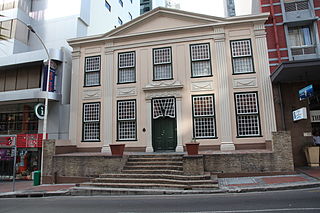
Koopmans-de Wet House is a former residence and current museum in Strand Street, Cape Town, South Africa. The house became part of the South African Museum in 1913 and was opened to the public on 10 March 1914. It was declared a National Monument under National Monuments Council legislation on 1 November 1940. It is the oldest house museum in South Africa.
Like South Africa's eight other provinces, the Northern Cape is governed by a parliamentary system, in which the Premier of the Northern Cape is elected by the Northern Cape Provincial Legislature and in turn selects the Northern Cape Executive Council. As in most other provinces, the African National Congress (ANC) has led the Northern Cape Provincial Government since the end of apartheid. In the most recent provincial election, held in 2019, the ANC won 18 of 30 seats in the provincial legislature and the Democratic Alliance was the official opposition in the legislature. Pursuant to the same election, Zamani Saul was elected Premier of the province.


The National Monuments Council (NMC) was the national heritage conservation authority of South Africa, and therefore also of Namibia, during the major part of the apartheid era. It was the successor body to the Historical Monuments Commission and became known principally for its declaration of several thousand national monuments. It came into being through the promulgation of the National Monuments Act of 1969 and ceased to exist on 31 March 2000 when it was replaced by SAHRA and the provincial heritage resources authorities established in terms of the National Heritage Resources Act of 1999.

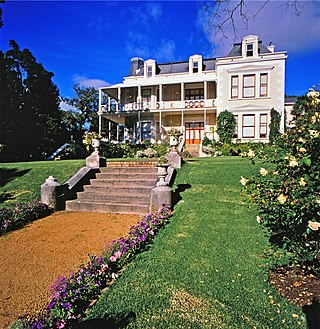
Hawthorndon House is a double-storeyed house on Herschel Walk in the suburb of Wynberg in Cape Town, South Africa. The house likely dates from 1683, but was substantially rebuilt in the French Victorian style in 1881 by a Capt. John Spence. It was bought by the Randlord Sir J.B. Robinson in 1891 and was where he lived until his death in 1927. Count Natale Labia, grandson of J.B. Robinson, donated Hawthornden to what is now the Government of the Western Cape Province in 1978, but will continue to live there during his lifetime.
Open access to scholarly communication in South Africa occurs online via journals, repositories, and a variety of other tools and platforms. Compared to other African nations, open access in South Africa has grown quickly in recent years.














